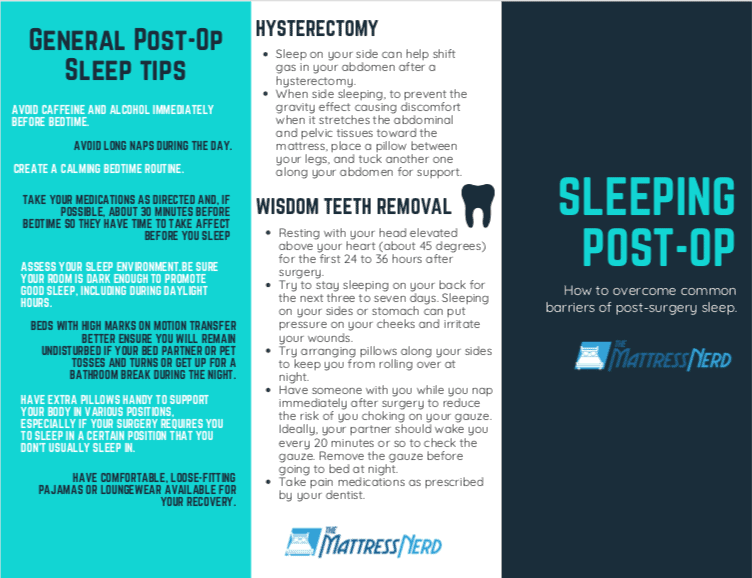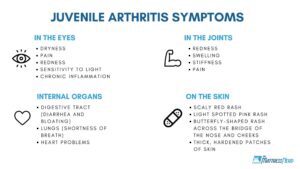Post Surgery Sleeping
Disclosure: By clicking on the product links in this article, Mattress Nerd may receive a commission fee at no cost to you, the reader. Read full disclosure statement.
Sleep helps the body heal. When we sleep, our brains trigger the release of hormones that trigger tissue growth and blood vessel repair. Sleep helps heal wounds and restores sore, damaged muscles. But following surgery — when our bodies need the healing powers of sleep the most — getting a good night’s rest can seem impossible.
According to a study published in the British Journal of Anaesthesia, most patients were sleep-deprived in the days after surgery, with total sleep time reduced by up to 80% on at least one of the first nights after surgery. Restorative REM sleep was also absent on the first night following surgery, and sometimes up to three nights after surgery.
Check out our take-home guide!
Why Is Sleep Interrupted After Surgery?
Some reasons for poor sleep after surgery include:
Fragmented sleep: If you’re recovering in the hospital, staff will likely be taking your vitals or administer medication every few hours throughout the night or during the day while you’re trying to nap.
Pain: Pain after surgery is common, and can make falling asleep difficult. It can also jolt you awake and prevent or interrupt restorative REM sleep. Even more frustrating, sleep problems can affect your body’s perception of pain, further impeding a good night’s sleep.
Medication: Some painkillers like opioids can make you feel relaxed and sleepy, but in general, they can seriously alter your sleep habits and cause insomnia. Conversely, steroids can make you feel energized, which can keep you from falling asleep.
Anesthesia: Anesthesia puts you to sleep during surgery, but it does not replace natural sleep. In fact, if you were under anesthesia for several hours, you could come out with a sleep debt, especially if you slept poorly in the days leading up to your surgery. Even worse, anesthesia can stay in your system for up to seven days, interfering with your sleep up to a week after surgery.
Major surgery: Major surgeries like joint replacements or open-heart surgery require longer hospital stays, longer recovery, hookups to medical equipment, and often, more medication, all of which can affect your quality of sleep.
Trauma of surgery: Your body responds metabolically and physiologically to surgery, which can affect your sleep. Metabolically, blood sugar levels may raise in response to the trauma, while time without food before and during surgery may cause a drop in blood sugar, which can lead to sleep interruptions or insomnia. Pituitary gland hormones and sympathetic nervous system “fight or flight” hormones are also released, which run counter to your need to sleep.
Emotional stress: Medical procedures can be stressful, both physically and emotionally. When you are anxious, falling asleep and staying asleep can be a challenge.
Environmental stress: If you have to spend a few days in the hospital for recovery from your surgery, you may experience environmental stressors that impede sleep, such as discomfort from tubes in your nose or mouth or IV needles in your arms, inability to move, thirst, uncomfortable room temperature, unfamiliar noises or smells, constant movement of staff, and limited interaction with family.
Sleep apnea/poor airway control: Sleep apnea is a sleep disorder during which your breathing pauses several times while you’re sleeping. This is caused by the soft tissues in the mouth falling to the back of your throat and obstructing your airway. Medications such as opioid painkillers can depress respiration and cause sleep apnea in healthy people in the days following surgery, or exasperate it in individuals already diagnosed with the sleep disorder.
Joint Replacement
Knee or hip replacement surgery is generally performed to help reduce pain and improve mobility in joints that have become damaged and inflamed. Even though joint replacement has a high success rate, it is a major surgery and could take up to six weeks for you to start to enjoy the benefits of your artificial hip or knee. Even after your pain is managed, you may still experience insomnia.
How to get better sleep after joint replacement surgery:
- Consider getting a new mattress with good pressure point relief at the hips and knees.
- Try sleeping on your back with a pillow between your legs at least until your wound heals.
- If you are a side sleeper, sleep on your non-operative side with two pillows running lengthwise between your legs.
Back Surgery
Back pain can interfere with sleep, and back surgery can help alleviate backaches so you can get a better night’s rest. However, most people who undergo back surgery will feel fatigued and experience some pain and mobility issues for the first few days after surgery. This should improve in time. If discomfort is keeping you awake, try sleeping in different positions. Generally speaking, the best sleeping position to reduce pain and your risk of developing complications following surgery is sleeping on your back. Stomach sleeping is not recommended because it strains the lower back. However, if you must sleep on your stomach, place a pillow under your hips and another, flatter pillow under the chest to lift the neck and reduce strain on your spine.
How to get better sleep after back surgery:
- Lie on your back to take the pressure off the lower back.
- Or, elevate the upper back either with pillows or an adjustable bed.
- Raise the knees so that they are slightly bent by sliding pillows under your knees. You can also do this with an adjustable bed.
- If you are more comfortable sleeping on your side, place a pillow between your knees.
- For side sleepers in particular, invest in a mattress with optimal spine alignment. This ensures a healthy recovery and continued comfort.
Cataract Removal
Cataracts are a clouding of the normally clear lens of the eye. They develop slowly over the course of years. Cataracts can interfere with daily activities and even your sleep by reducing the amount of light that reaches the retina in the back of the eye. This can cause an abnormal circadian rhythm that can disrupt your sleep-wake patterns. Cataract removal allows the light to come into the eyes again, which may bring your circadian rhythm — and your sleep — back to normal. As a result, many people report improved sleep following cataract surgery.
Cataract removal has become extremely routine and can take as little as 10 minutes. But recovery can take up to four weeks for some people. It is important to follow your doctor’s recommendations since cataract surgery puts you at increased risk for infection.
How to get better sleep after cataract surgery:
- It is extremely important that you wear the eye shield for a few days following surgery, even when you are sleeping.
- Avoid sleeping on the side that you had surgery on, if possible since the pillow can irritate the affected eye. Instead, sleep on your back or the opposite side.
- Use pillows to keep your body from rolling onto your affected side or onto your belly.
C-Section
Cesarean delivery is a major surgery involving an incision through the abdomen into the uterus to remove a baby. You won’t feel any pain during a C-section because you will likely have a spinal block or epidural to numb the pain. But you may feel sensations like pulling and pressure. After the anesthesia wears off, you may feel pain at the incision site or post-labor cramping as the uterus shrinks. Most women recovering from a C-section stay in the hospital 2 to 4 days.
In general, C-section deliveries are more painful and require more recovery time than vaginal births. It is imperative that women get rest after a C-section, especially since they will need their strength to care for their baby once they are able to go home from the hospital.
If you are one of the many women who suffered from heartburn while pregnant, you may still experience bouts of acid reflux after delivery. You may also experience insomnia. This can be due to pain, medications, fatigue, general discomfort, or even postpartum depression.
How to get better sleep after a C-section:
- For heartburn sufferers, sleep with your head raised on pillows or with an adjustable bed.
- Sleep on your back. This will keep pressure off your incision.
- Sleep on your side with a pillow to support your belly. Sleeping on your left side, in particular, can help with blood flow and reduces acid reflux.
- Wear comfortable pajamas or loungewear.
- Don’t forget to baby yourself as you recover. Be sure you have a mattress that provides comfort and support.
Broken Bone Repair
While some broken bones can heal on their own with the aid of a cast or brace, more serious breaks or fractures may require surgery. Broken bone repair generally involves using metal screws, pins, rods, or plates to hold the bone. Healing can take several weeks to several months, and in some cases, several years. As with any surgery, sleep will likely be compromised due to anesthesia, painkillers, and pain. In one study of patients with broken bones, 41% with shoulder fractures and 36% with knee fractures reported having difficulty sleeping three months after their injury. And, 20% of them reported suffering from insomnia a year after their injury.
The irony is that the timing and duration of sleep is crucial to bone restoration and repair. And adequate sleep can have a detrimental effect on your bones. A University at Buffalo study found that postmenopausal women who reported sleeping five hours or less had significantly lower bone mineral density throughout their body and especially at the hip, neck, and spine, compared to women who slept at least seven hours a night.
How to get better sleep after broken bone repair surgery:
- Use pillows to keep the broken bone elevated above the heart to prevent blood pooling and reduce swelling.
- Try sleeping on your back. If that’s not comfortable, try sleeping on your side.
- Heavy casts and sling can be cumbersome as well as hot. Be sure to wear loose-fitting clothes to bed.
- If your mattress doesn’t have excellent motion isolation that prevents your bed partner or pet from jostling you awake when they turn over or move around, then ask them to sleep in another room. Unexpected movements can be painful and disruptive to your sleep.
Gallbladder Removal
Hundreds of thousands of people undergo gallbladder surgery each year. The standard procedure is a less invasive laparoscopic cholecystectomy. However, in some cases, open surgery is required. Some studies suggest that patients who undergo cholecystectomy have fewer sleep disturbances than patients who undergo more invasive abdominal surgeries. One reason may be because less-invasive gallbladder removal is generally done as outpatient surgery, enabling you to recovery at home.
How to get better sleep after gallbladder removal:
- Be gentle with what you put in your belly for a few days to reduce discomfort at bedtime. Limit your diet after surgery to clear liquids, gelatin and broth.
- Avoid sleeping on your stomach. Instead, sleep on your back and use pillows or an adjustable bed to gently prop up your head.
- If you’re a side sleeper, use pillows to prop against your belly to keep your wound site supported.
- Invest in a mattress with high motion isolation marks before surgery, especially if you sleep with a partner or a pet.
Mastectomy
There are numerous studies addressing sleep issues among women who have undergone a mastectomy due to cancer and, depending on the study, about 60% to 90% experience problems sleeping. Comparatively, 55% of women who have never had cancer have difficulty sleeping. A cancer diagnosis alone can create sleep-robbing stress. Physical pain from surgery and complications like lymphedema make quality sleep even more elusive. These individuals (men can get breast cancer and require mastectomies, too) can also fall victim to circadian rhythm disruptions, fragmented sleep, sleep-movement disorders such as restless leg syndrome (RLS), and sleep-disordered breathing such as sleep apnea.
Yet sleep is vital for recovery as well as physical, mental, and emotional health. A study published in the journal Sleep found that among women with advanced breast cancer, those who reported being efficient sleepers had a mean survival 68.9 months compared to 33.2 months for women who said they slept poorly.
How to get better sleep after mastectomy:
- After surgery, you will wear a surgical bra that provides support and holds your drains in place. You will need to wear this while you sleep through your recovery as well as after reconstruction if you choose that option.
- It is important that you sleep on your back for the first couple of weeks. Rolling onto your sides could put pressure on your implants or your incisions, which can be painful. To make this position more comfortable, use pillows at your sides. Or, try elevating your head with pillows or an adjustable bed.
- Invest in a new mattress, such as a memory foam mattress that contours your body and evenly distributes your body weight.
- Talk with your doctor about treatments for sleep disorders, and how best to treat them. Some disorders, like sleep apnea, can be dangerous.
- Cognitive-behavioral therapy can help reduce stress and anxiety associated with your diagnosis and ultimately clear up issues like anxiety and RLS to help you sleep better.
Bypass Surgery
Poor quality sleep is common for patients after undergoing a major surgery like heart bypass surgery (also called coronary artery bypass), with more than half of patients experiencing sleep problems during their hospital stay and as long as six months after heart surgery. This is often due to the effects of anesthesia, pain and discomfort from surgery, and psychological factors such as anxiety and depression. Heart surgery is major surgery and patients are at increased risk of depression following the procedure.
How to get better sleep after bypass surgery:
- Sleep in whatever position is most comfortable for you. It’s OK to sleep on your back, side, or stomach. You won’t hurt your incision.
- Use pillows to maintain a comfortable position and decrease any strain on muscles.
- If a vein was harvested from your lower legs, you may experience discomfort. Try placing pillows under your feet or elevating your legs with an adjustable bed. Or, try wearing a type of compression stocking called thromboembolic deterrent (TED) hose.
- Take rest breaks between your normal daily activities, but try not to nap longer than 20 minutes.
- Avoid caffeine in the evenings.
- Consider cognitive behavioral therapy for post-surgery anxiety or depression.
Hysterectomy
More than 60% of women experience sleep problems like insomnia when going through perimenopause (the time before menopause when hormone levels and menstrual periods become irregular). Often sleep problems persist through menopause with issues like night sweats you up. Women who have their ovaries removed — with or without hysterectomy — are abruptly thrown into menopause and can experience the same sleep problems women who gradually go through menopause do, a study published in the journal Menopause reported.
Hysterectomies are major surgeries, and some must be performed traditionally with a six- to 12-inch incision in the abdomen. Recent technological advances, which include vaginal and robotic-assisted laparoscopic hysterectomies, are much less invasive procedures with less discomfort, reduced risk of infection, and shorter length of recovery. Research suggests that women who undergo abdominal hysterectomy have greater trouble sleeping during the first week of recovery than women who underwent a vaginal hysterectomy due to wound pain, gas pain, coughing, discomfort, and nausea. Other studies have found women who underwent vaginal hysterectomy had significantly more sleep disturbances at three weeks post-surgery than women who had an abdominal hysterectomy.
How to get better sleep after hysterectomy:
- Sleep on your back with a pillow under your knees, or use an adjustable bed.
- Sleep on your side can help shift gas in your abdomen after a hysterectomy.
- When side sleeping, to prevent the gravity effect causing discomfort when it stretches the abdominal and pelvic tissues toward the mattress, place a pillow between your legs, and tuck another one along your abdomen for support.
Wisdom Teeth Removal
Americans have an estimated 10 million wisdom teeth extracted each year, often when they are in their teen or young adult years. If your teeth are impacted or partially impacted — that is, if they are hidden under the gums or only partially broken through — the surgery can involve general anesthesia, stitches, and about a week or two of bed rest and soft foods.
While wisdom teeth removal doesn’t hurt thanks to local or general anesthesia, you can count on pain after surgery. This is generally tempered with pain medication. Sleep is an important part of your post-procedure recovery. However, getting good sleep after wisdom teeth extraction may seem daunting.
How to get better sleep after wisdom teeth removal:
- Blood vessels tend to constrict and blood volume increases at the wound site, which means lying flat on your back can make your wound throb and possibly bleed. Reduce this risk by resting with your head elevated above your heart (about 45 degrees) for the first 24 to 36 hours after surgery. You can do this by resting in a recliner, propping your head up with pillows, or lying in an adjustable bed.
- After immediate recovery, try to stay sleeping on your back for the next three to seven days. Sleeping on your sides or stomach can put pressure on your cheeks and irritate your wounds. Try arranging pillows along your sides to keep you from rolling over at night.
- You may be sent home with gauze pads in your mouth to help with the bleeding. It is important to have someone with you while you nap immediately after surgery to reduce the risk of you choking on the gauze. Ideally, your partner should wake you every 20 minutes or so to check the gauze.
- Remove the gauze before going to bed at night.
- Take pain medications as prescribed by your dentist. Do not take more than recommended.
General Post-Surgery Sleep Tips
After undergoing surgery, our bodies need sleep. Sleep restores our minds as well as our bodies, enabling us to recover faster and more fully. But sleep problems after surgery — both short- and long-term — are common. Preparing yourself and your recovery environment for the days and weeks following surgery can help improve your chances of getting quality sleep and enable your body to recover faster.
Here are some general tips on how to sleep better after surgery:
- Avoid caffeine and alcohol immediately before bedtime.
- Avoid long naps during the day.
- Create a calming bedtime routine. Take a warm shower or listen to soothing music or meditative audio before bedtime.
- Take your medications as directed and, if possible, about 30 minutes before bedtime so they have time to take affect before you sleep.
- Assess your sleep environment.
- Be sure your room is dark enough to promote good sleep, including during daylight hours. If not, pick up an eye mask.
- Following surgery, you may be a bit wobblily from medication and prone to falls or bumping into things. So, have a night light in case you take a middle-of-the-night bathroom break.
- Use earplugs to help you avoid noises that might jolt you awake either overnight or during daytime naps.
- Have extra pillows handy to support your body in various positions, especially if your surgery requires you to sleep in a certain position that you don’t usually sleep in.
- Be sure your bed linens are comfortable and laundered and have an extra clean set on hand.
- Have comfortable, loose-fitting pajamas or loungewear available for your recovery.
- Invest in a new mattress.
- Memory foam mattresses are great for cushioning your body. Some mattresses emphasize lumbar support to ease back pain or pressure point relief at the shoulders and hips.
- Beds with high marks on motion transfer better ensure you will remain undisturbed if your bed partner or pet tosses and turns or get up for a bathroom break during the night.
- Adjustable mattresses with adjustable bed frames allow you to raise your head or legs — or both — for added comfort.



